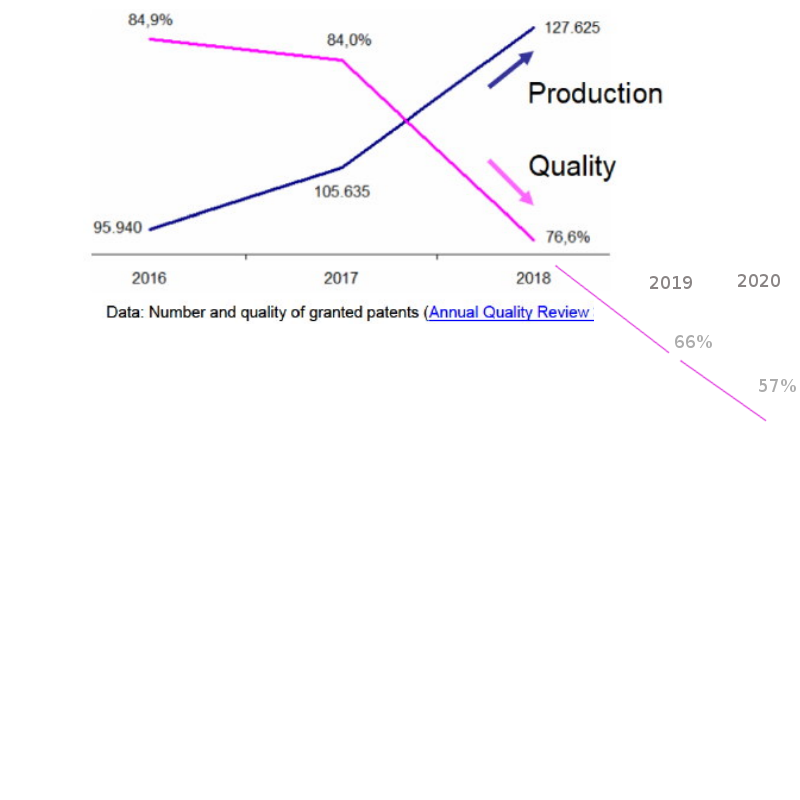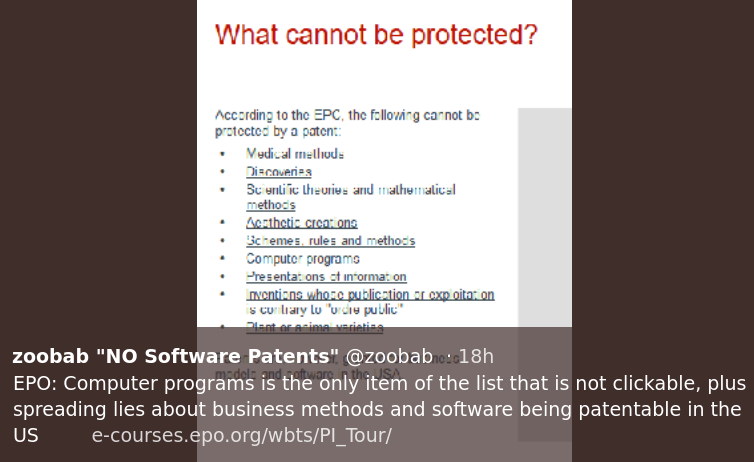

Graph extrapolated from the EPO's own numbers
THINGS have not improved at the European Patent Office (EPO) since António Campinos hopped on the saddle and the penthouse of Battistelli. One can argue that things got even worse (compared to 2018) and quality of European Patents is quantifiably and verifiably worse. The EPO sometimes calls software patents just "software patents" (no made-up buzzwords) and gets away with granting these.
"The EPO sometimes calls software patents just "software patents" (no made-up buzzwords) and gets away with granting these."Will workers be going on strike again? Judging by these results, it's very much possible. A strike ballot was initially planned in summer, but Campinos managed to buy some time. Well, not anymore. "There was a strike ballot in Munich today," Märpel wrote on Thursday night, having "learned that 83% of staff voted in favour of the strike. Märpel wonders what is next."
That's about 5 out of 6 people, under an intimidating atmosphere, as we noted when the protest/demonstration was covered in the media. As we put it a fortnight ago, "EPO management in Rijswijk tried hard to prevent workers from protesting on their free time (lunch break), reaffirming that same old belief that nothing is changing at the EPO and nothing will change without truly disruptive action..."
Well, disruptive actions may be about to begin. Suffice to say, EPO management won't say a word about these. It never does. It pretends no issues exist. That's their "official policy". Sometimes they drown out the media with puff pieces to dilute the signal with noise, as happened earlier this month (we wrote several articles to highlight this).
"Sometimes they drown out the media with puff pieces to dilute the signal with noise, as happened earlier this month (we wrote several articles to highlight this)."So what does Campinos have to show after nearly 1.5 years at the Office? What has he? What was accomplished?
"Four patent applications are filed worldwide every minute," the EPO bragged yesterday. As the patent maximalists are so mentally detached, they probably think each of these applications is some major invention rather than a ploy of large companies (evergreening, slight modifications etc.) and it's interesting to see the EPO so openly bragging about patent applications' pace rather than merit/quality. "We could write a script to generate more than that on just one computer," I told them, citing the likes of SCIgen, which isn't even new.
Benjamin Henrion asked: "How many PPS (Patents Per Second) can it generate to flood the system?"
"EPO brags about 0.07 patent applications per second today," I replied, and "I assume WIPO considers each of these to be sacred... China already games WIPO with a torrent of low-quality patents and amid decline in numbers (in other countries) Gurry and his criminal colleagues (this is well documented) are happy to accept this gaming..."
"China is perhaps the only large country that formally allows software patenting..."Maybe we can call this "patent doping!"
Henrion took note of this tweet which quotes: "China nominated a candidate to head the WIPO [...] The Chinese bid poses a challenge for the United States, which has been pushing to contain China’s rise as a technological superpower..."
China is perhaps the only large country that formally allows software patenting and Henrion noted that the EPO lies about it, arguing that "Computer programs is the only item of the list that is not clickable, plus spreading lies about business methods and software being patentable in the US" (citing the EPO's E-courses). There's a screenshot there. We've included it at the bottom, knowing that Twitter plans to eliminate millions of legitimate accounts some time very soon (including dead people's accounts).

"If the patent playground is a playground of those who profit from litigation (not actual scientists), whose agenda will be promoted and how will laws be shaped? In whose favour?"It's no secret that the 'European' Patent Office uses such buzzwords and lies to let itself grant illegal software patents in Europe [2] (new article about it, albeit behind paywall) and Karl Barnfather (Withers & Rogers) continues to reaffirm what we've long said about media coverage regarding patents. It's composed directly or indirectly by law/litigation firms, not journalists. It's quite a crisis.
If the patent playground is a playground of those who profit from litigation (not actual scientists), whose agenda will be promoted and how will laws be shaped? In whose favour?
"Have you seen the new Espacenet? It's got new features & functions," the EPO wrote yesterday.
"The discussion forum is a dead zone," I told them, "so one can guess not many people use Espacenet (why would they? These searches make one liable with treble damages)..."
"Well, "mock oral proceedings" are becoming routine, just like the real thing (where every trial is a mock trial, as justice does not exist).""Trade marks can add value to #patents and extend protection beyond the life of a patent," the EPO added. They're basically marketing EUIPO. Trademarks are symbols and names. So what the EPO says is akin to fusion of totally unrelated laws. In practice many businesses resort to evergreening if they want patent perpetuity.
The EPO then said: "We're running a seminar where you can take part in mock oral proceedings designed to let you experience a variety of events in real time, in a variety of roles, with the support of a tutor."
Well, "mock oral proceedings" are becoming routine, just like the real thing (where every trial is a mock trial, as justice does not exist). We'll say more about it in our next post. ⬆
Related/contextual items from the news:
Throughout history, innovation has been the result of direct human intervention that creates a technical solution to a practical problem. For hundreds of years, nations around the world have sought to incentivize innovation by giving inventors the right to protect their creations with patents. Recently one legal team has pressured patent offices around the world to answer one question: Can patent protections be extended to inventions developed by technology, not humans?
Late last autumn, patent applications were filed with the UK Intellectual Property Office and the European Patent Office on behalf of an artificial intelligence inventor known as "DABUS," which creates new ideas by altering the interconnections among a set of neural networks in the system. Once those ideas are generated, a second set of neural networks analyzes them to reinforce any that are novel or useful. DABUS is the invention of Dr. Stephen Thaler, President and CEO of the St. Charles, Missouri-based neural networking firm Imagination Engines.
[...]
At the origin of the legal team filing the patent applications on DABUS's behalf is Dr. Malte Köllner, Head of Dennemeyer's Frankfurt office. He instigated an international attorney team to submit patent applications on behalf of DABUS in Great Brittain, Germany, Europe, Taiwan, Israel and the US, as well as a PCT application. The idea to file patent applications listing an AI inventor was born in the Frankfurt office following a discussion on the topic with patent attorney Markus Rieck and Ryan Abbott, a professor of law and health sciences at the University of Surrey. Dr. Köllner said that filing these patent applications was the right way to get patent offices to consider how they will address the growing issue of innovation from AI platforms. "If the court finds some solution, that is fine, but it should not simply ignore the fact that machines are inventing," Dr. Köllner said. "We are beginning a debate and inviting both patent offices and courts to decide on how to deal with this issue. This is a question whose time has come."
[...]
Over at the EPO, a decision on the fate of the DABUS patent applications is expected on November 25.
Eventually, patent offices around the world will have to find a solution how to handle this new phenomenon that AI is contributing to inventions. "It is an international discussion, and it will be interesting to see how different countries will come up with different solutions," Dr. Köllner said.
Withers & Rogers Karl Barnfather examines the European Patent Office's 'Guidelines for Examination', which took effect on 1st November